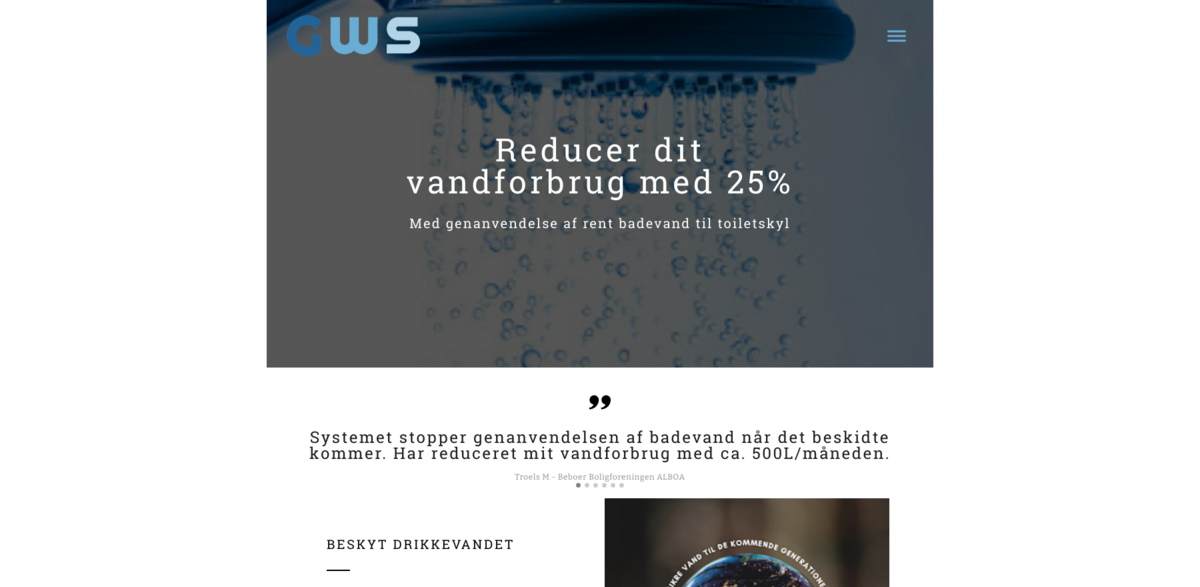What the Project Is
The project introduces an innovative solution designed to reduce water consumption by 25% through the recycling of clean shower water for toilet flushing. This smart system, developed by GreyWaterSolution, reuses 70% of shower water by carefully analyzing its quality through advanced sensor technology. A sensor detects the water quality, deciding which water should be recycled and which is too contaminated for reuse. The system automatically stops recycling as soon as dirty water appears, ensuring that only clean water is utilized. By redirecting shower water away from being wasted, it not only cuts down on overall water usage but also protects the limited supply of drinking water—a resource that is becoming increasingly scarce in several parts of Denmark. The technology is completely automatic, easy to use, and economically viable, positioning it as both an environmentally and financially intelligent solution.
Main Benefit
The primary advantages of this project are evident in the impressive savings and environmental impact it delivers:
- Reduces water consumption by 25%, contributing significantly to sustainable living.
- Recalles up to 70% of clean shower water for toilet flushing, ensuring efficient water use.
- Saves between 1500-2200 liters of water per month, an essential resource conserved for future generations.
- Reports indicate a personal saving of about 500 liters per month, with an annual potential saving of approximately 10,000 liters for a regular person.
- Offers a payback time ranging from 6-10 years, which is competitive compared to other solutions like solar panels or insulation.
- Delivers annual cost savings of roughly 3,000 DKK for a household of four by cutting down on water bills and future-proofing the home against rising water prices.
Technical Features and Innovation
At the heart of this project lies a state-of-the-art technological solution that is as innovative as it is practical. The system automatically scrutinizes the shower water, determining through sensor-based analysis which water retains its purity and which water has become unsuitable for reuse. Only the clean, useable fraction of shower water is piped into the toilet flushing system. This process not only protects the integrity of the recycled water but also ensures efficient operation without compromising health or hygiene. The technology embodies a perfect blend of automation and smart design, making it extremely user-friendly. It is engineered to be both reliable and sustainable, adapting in real time to fluctuations in water quality, thereby optimizing performance in everyday use. This seamless integration within a household’s plumbing system translates into immediate benefits—a reduction in water waste and a leap towards greener living.
Sustainability and Environmental Impact
In a world where clean drinking water is increasingly rare, this project stands out as a vital step towards sustainability. With drinking water often containing chemical residues and, at times, exceeding safe limit values, recycling shower water for non-potable applications represents a responsible and innovative approach. The system directly addresses the environmental challenges faced by areas in Denmark, where up to 63% of drinking water includes chemical residues and 14% exceeds regulatory limits. The solution underscores the importance of using clean water where it is most needed, and it challenges the norm of flushing precious drinking water down the toilet. By reducing consumption significantly and diverting water used for showering, the project reinforces the necessity to preserve drinking water resources for critical human needs and for future generations. It is a forward-thinking strategy that champions resource conservation while promoting a broader climate and sustainability mindset.
Economic Advantages and Long-Term Savings
The financial merits of this system are as compelling as its ecological benefits. Rising water costs—with prices reportedly increasing by 100% over the past 20 years—make the case for a more sustainable water usage strategy even stronger. When a household integrates the GWS Blue Flow system, the impact immediately translates into a 25% reduction in water bills, ultimately yielding an annual saving of approximately 3,000 DKK for a family of four. This economic advantage is backed by a short payback period of 6-10 years, a duration that compares favorably to other home improvement investments like solar panels or insulation, which typically require 8-12 years to recoup their costs. The cost-effectiveness of the system is evident not just in monetary terms but also in its potential to alleviate future resource constraints. By reusing water that would otherwise be wasted, the project offers an attractive route towards more sustainable living, where efficiency meets practicality and long-term savings are realized through smart, automated technology.
Project Impact
- SDG 6: Clean Water and Sanitation
- SDG 12: Responsible Consumption and Production
- SDG 13: Climate Action
- SDG 11: Sustainable Cities and Communities
Looking Ahead to a Sustainable Future
The initiative not only highlights how everyday technology can contribute significantly to sustainability but also sets a promising precedent for future innovations. By reusing the clean portion of shower water for toilet flushing, the solution addresses both an environmental and economic need, ensuring that drinking water remains available for essential purposes. The project is a testament to the potential of technology to alter traditional usage patterns and challenges the assumption that all water used in households must come directly from drinking water sources. With the climate mindset becoming increasingly central in modern society, the implementation of such a system demonstrates that even minor changes in daily routines can yield substantial benefits. The approach is both forward-thinking and deeply rooted in practicality—protecting a scarce resource, reducing household expenses, and encouraging a more responsible way of living. As water scarcity becomes more pronounced in urban centers, innovations like these offer a glimpse into a future where preservation, efficiency, and sustainability are integrated into the fabric of everyday life. The combination of technology and a commitment to environmental protection paves the way for a greener, more resilient future, where every drop of water is valued. It is proof that innovative recycling techniques can truly make a difference, ultimately ensuring that clean drinking water is preserved for generations to come.


















